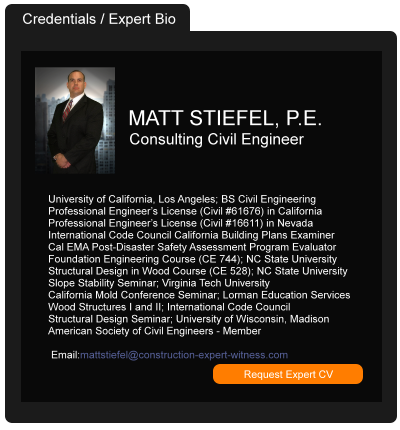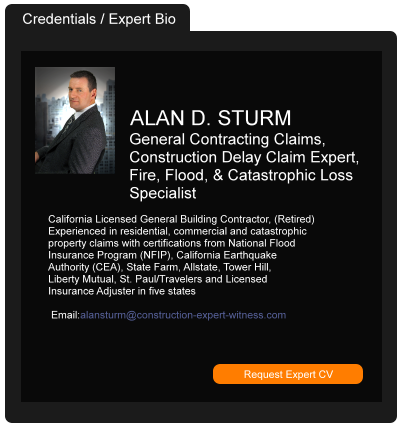Insureds' Summary Judgment Motion on Mold Limitation Denied
November 10, 2016 —
Tred R. Eyerly – Insurance Law HawaiiThe insureds' motion for partial summary judgment on the applicability of the homeowner's mold limitation was denied. R.W.& R. v. Liberty Mutual Fire Ins. Co., 2016 U.S.Dist. LEXIS 131586 (W.D. Wash. Sept. 26, 2016).
The policy imposed a $5,000 limit on losses caused by mold. Plaintiffs discovered that their dishwasher was leaking and reported the loss to Liberty. Liberty's contractor concluded that the bottom of the dishwasher had rusted out, causing water to seep into parts of the kitchen and the laundry/utility room below. The contractor used dehumidifiers to extract moisture from the affected areas and removed damaged cabinetry, drywall and tiling. The contractor discovered mold that it believed predated the dishwasher leak. Although the contractor took steps to remove the mold, its dehumidification efforts exacerbated the problem by dispersing mold spores throughout portions of the house.
Read the court decisionRead the full story...Reprinted courtesy of
Tred R. Eyerly, Insurance Law HawaiiMr. Eyerly may be contacted at
te@hawaiilawyer.com
Fourth Circuit Holds that a Municipal Stormwater Management Assessment is a Fee and Not a Prohibited Railroad Tax
April 22, 2019 —
Anthony B. Cavender - Gravel2GavelOn February 15, the U.S. Court of Appeals for the Fourth Circuit decided Norfolk Southern Railway Co. v. City of Roanoke, et al.; the Chesapeake Bay Foundation was an Intervenor-Defendant. The Fourth Circuit held that a large stormwater management fee (stated to be $417,000.00 for the year 2017) levied by the City of Roanoke against the railroad to assist in the financing of the City’s permitted municipal stormwater management system was a permissible fee and not a discriminatory tax placed on the railroad.
The Railroad Revitalization and Regulatory Reform Act of 1976 specifically provides that states and localities may not impose any tax that discriminates against a rail carrier, 49 U.S.C. § 11501. Accordingly, the issue confronting the Fourth Circuit was whether the assessment was fee and not a tax.
Read the court decisionRead the full story...Reprinted courtesy of
Anthony B. Cavender, PillsburyMr. Cavender may be contacted at
anthony.cavender@pillsburylaw.com
New York High Court: “Issued or Delivered” Includes Policies Insuring Risks in New York
December 20, 2017 —
Bethany Barrese & Samantha Martino - Case Alert BlogOn November 20th, the New York Court of Appeals reinstated a case seeking more than six million dollars in damages against the insurers for DHL Worldwide Express Inc. (“DHL”), originating from a fatal head-on car crash between Claudia Carlson and a truck owned by MVP Delivery and Logistics Inc. (“MVP”), a DHL contractor. The truck, which bore DHL’s logo, was owned by MVP and driven by an MVP employee. The MVP employee was running an errand unrelated to his job at the time of the accident. Mrs. Carlson’s husband sued the employee, DHL, and MVP. The jury award of $20 million was reduced to $7.3 million by the Appellate Division. MVP’s insurer paid Mr. Carlson just over $1 million, and the employee assigned his rights to any other insurance coverage to Mr. Carlson
Mr. Carlson sued DHL and its insurers, seeking the balance of the outstanding judgment pursuant to New York Insurance Law § 3420. The defendants successfully moved to dismiss Mr. Carlson’s claims, which dismissal was affirmed by the Appellate Division on the basis that § 3420 did not apply since the policies in question were not “issued or delivered” in New York; they had been issued in New Jersey and delivered in Washington and Florida. The Court of Appeals was subsequently presented with two questions: (1) whether the DHL policies fell within the purview of Insurance Law § 3420 as policies “issued or delivered” in New York; and (2) whether MVP was an “insured” pursuant to the “hired auto” provisions of DHL’s policies.
Reprinted courtesy of
Bethany Barrese, Saxe Doernberger & Vita, P.C. and
Samantha Martino, Saxe Doernberger & Vita, P.C.
Ms. Barrese may be contacted at blb@sdvlaw.com
Ms. Martino may be contacted at smm@sdvlaw.com
Read the court decisionRead the full story...Reprinted courtesy of
Timely Legal Trends and Developments for Construction
February 18, 2019 —
Matt Viator - Construction ExecutiveThe construction industry is broad and the legal concerns of industry members can be far-reaching. What seems like tomorrow’s problem often jumps to the forefront and becomes a high priority today. 2018 was full of moments like these – and it’s important to keep track of legal developments for a glimpse at what may be waiting around the corner. With that in mind, here are some of the most important legal developments for the construction industry from the second half of 2018.
Sureties and Litigation – a Broad Topic
Sureties play a vital role on construction projects. On federal jobs and state, county or municipal jobs, surety bonds are typically required. That means it’s important to stay on top of how the courts are treating surety agreements.
Reprinted courtesy of
Matt Viator, Construction Executive, a publication of Associated Builders and Contractors. All rights reserved.
Read the court decisionRead the full story...Reprinted courtesy of
Insurer's Motion for Summary Judgment in Collapse Case Denied
November 10, 2016 —
Tred R. Eyerly – Insurance Law HawaiiThe court denied the insurer's motion for summary judgment seeking to establish it did not breach the policy when denying coverage for the collapse of basement walls. Belz v. Peerless Ins. Co., 2016 U.S. Dist. LEXIS 118900 (D. Conn. Sept. 2, 2016).
The Belzes purchased their home in 2001. Prior to the purchase, they were aware of notable cracking in the basement walls. An engineer was hired to inspect the cracking and determined the cracks did not threaten the structural integrity of the home.
Read the court decisionRead the full story...Reprinted courtesy of
Tred R. Eyerly, Insurance Law HawaiiMr. Eyerly may be contacted at
te@hawaiilawyer.com
Reports of the Death of SB800 are Greatly Exaggerated – The Court of Appeal Revives Mandatory SB800 Procedures
September 03, 2015 —
Steven M. Cvitanovic & David A. Harris – Haight Brown & Bonesteel LLPIn a 20 page opinion, the Court of Appeal for the Fifth District repudiated the holding of Liberty Mutual Insurance Co. v. Brookfield Crystal Cove, LLC (2013) 219 Cal.App.4th 98 (“Liberty Mutual”), and held that plaintiffs in construction defect actions must comply with the statutory pre-litigation inspection and repair procedures mandated by SB800 (the “Act”) regardless of whether they plead a cause of action for violation of the Act. The Case, McMillin Albany LLC v. Superior Court (Carl Van Tassell), (Ct. of Appeal F069370) breathes new life into the Act’s right to repair requirements, and reinforces the Act’s stated purpose of seeking to limit the number of court cases by allowing a builder to resolve construction defect claims by agreeing to repair the homeowners’ residence.
In McMillin, 37 homeowners filed a lawsuit against McMillin, the builder of their homes, alleging eight causes of action, including strict products liability, negligence, and breach of express and implied warranty. Plaintiffs’ third cause of action alleged violations of the Act. The plaintiffs did not follow the Act’s notification procedures and filed their lawsuit without providing McMillin with an opportunity to repair the alleged defects. Plaintiffs and McMillin attempted to negotiate a stay of the lawsuit to complete the Act’s prelitigation procedures. When talks broke down, plaintiffs dismissed the third cause of action and contended they were no longer required to follow the Act’s prelitigation procedures. McMillin filed a motion to stay with the trial court. The trial court denied McMillin’s motion concluding that under Liberty Mutual, “[plaintiffs] were entitled to plead common law causes of action in lieu of a cause of action for violation of the building standards set out in [the Act], and they were not required to submit to the prelitigation process of the Act when their complaint did not allege any cause of action for violation of the Act.”
Reprinted courtesy of
Steven M. Cvitanovic, Haight Brown & Bonesteel LLP and
David A. Harris, Haight Brown & Bonesteel LLP
Mr. Cvitanovic may be contacted at scvitanovic@hbblaw.com
Mr. Harris may be contacted at dharris@hbblaw.com
Read the court decisionRead the full story...Reprinted courtesy of
Congratulations to Partner Madeline Arcellana on Her Selection as a Top Rank Attorney in Nevada!
July 02, 2024 —
Dolores Montoya - Bremer Whyte Brown & O'Meara LLPBremer Whyte Brown & O’Meara, LLP is proud to announce that Las Vegas Partner
Madeline Arcellana was once again selected by Nevada Business Magazine as a Top Rank Attorney in Nevada for her work in Civil Litigation, General Liability, and Personal Injury!
Nevada Business Magazine‘s Top Rank Attorneys list is comprised of attorneys in both private and public practice who are voted for by nearly 3,000 Nevada-licensed attorneys.
The attorneys on this list are at the top of their field and each nomination is put through an extensive verification process. To view Nevada’s 2024 Top Rank Attorneys, please click
here.
Read the court decisionRead the full story...Reprinted courtesy of
Dolores Montoya, Bremer Whyte Brown & O'Meara LLP
Specified Or Designated Operations Endorsement – Limitation of Insurance Coverage
July 15, 2024 —
David Adelstein - Florida Construction Legal UpdatesYour commercial general liability (CGL) policy may contain a specified or designated operations endorsement. This does not operate as an exclusion but as a LIMITATION of coverage. The endorsement may provide that bodily injury or property damage ONLY applies to the operations or business described therein. Similarly, there may be a limitation of coverage for designated classifications or codes which has the same effect—limiting coverage to the classifications/codes listed therein. This is an important consideration, and you need to understand and watch out for such limitations of coverage. (These aren’t the only ones, but it’s important to appreciate that limitations of coverage operate to limit the coverage to which the CGL policy applies.)
The Eleventh Circuit Court of Appeal dealt with this exact issue under Alabama law (although the same analysis would apply in numerous jurisdictions). In this case, a landscaper (the insured) had a CGL policy with a specified operations endorsement that limited coverage to landscaping operations. The landscaper was hired to install an in-ground trampoline in addition to site and landscaping operations at a house. A person got hurt using the trampoline and the landscaper was sued. The CGL insurer denied coverage outright (and, thus, any duty to defend) because the complaint asserted that the injury occurred from the landscaper’s assembly and installation of the trampoline, which was not a landscaping operation. Furthermore, the Eleventh Circuit noted that the landscaper’s insurance application specified that the landscaper did not perform any recreational or playground equipment erection or construction, and the installation and assembly of a trampoline would constitute recreational or playground equipment.
Read the court decisionRead the full story...Reprinted courtesy of
David Adelstein, Kirwin Norris, P.A.Mr. Adelstein may be contacted at
dma@kirwinnorris.com


































































